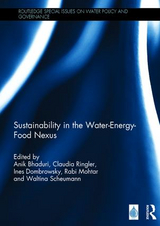Sustainability in the water-energy-food nexus
Anik Bhaduri / Claudia Ringler / Ines Dombrowsky / Rabi Mohtar / Waltina Scheumann (eds.)
Buchveröffentlichungen
(2017)
Abingdon, UK: Routledge
ISBN: 978-1-13822-207-6
Information
Today we are more than ever convinced that security in food, energy and water is interwoven with human, economic and environmental sustainability, and that this interplay is strengthening under growing natural resource scarcity and climate change. This recognition suggests that policy making and decision making for sustainability could benefit from a holistic nexus approach that reduces trade-offs and builds synergies across sectors, and thus helps reduce costs and increase benefits for humans and nature, as compared to independent approaches to the management of water, energy and food, without compromising the resource basis on which humanity relies. In the past, research and policy work related to the nexus has looked at the interactions between water and food or water and energy, but given political and institutional realities there has been a reluctance to bring forward a broader systemic perspective to capture the dependencies across multiple sectors and resources. At the same time, the cost to the environment of neglecting these linkages has increased. The players in the nexus approach are public, private and civil society at local and broader human scales. Recognizing the urgent need to focus on sustainability in the water–energy–food nexus (WEF nexus) together with tools to analyze and approaches to govern the linkages at different scales, the Global Water System Project, the United Nations Environment Programme, the Deutsches Institut für Entwicklungspolitik, the Center for Development Research (ZEF), University of Bonn, and the CGIAR Research Program on Water Land and Ecosystems organized an international conference, Sustainability in the Water-Energy-Food Nexus, in Bonn, Germany, in 2014. This volume addresses sustainability in the WEF nexus as a key research-for-action initiative, and included an international policy consultation process to inform, influence and catalyze action of policy makers, nongovernmental organizations, the private sector, educators and researchers towards a nexus approach that both draws on and supports the environment.
Über die IDOS-Autor*innen
Weitere IDOS-Expert*innen zu diesem Thema



